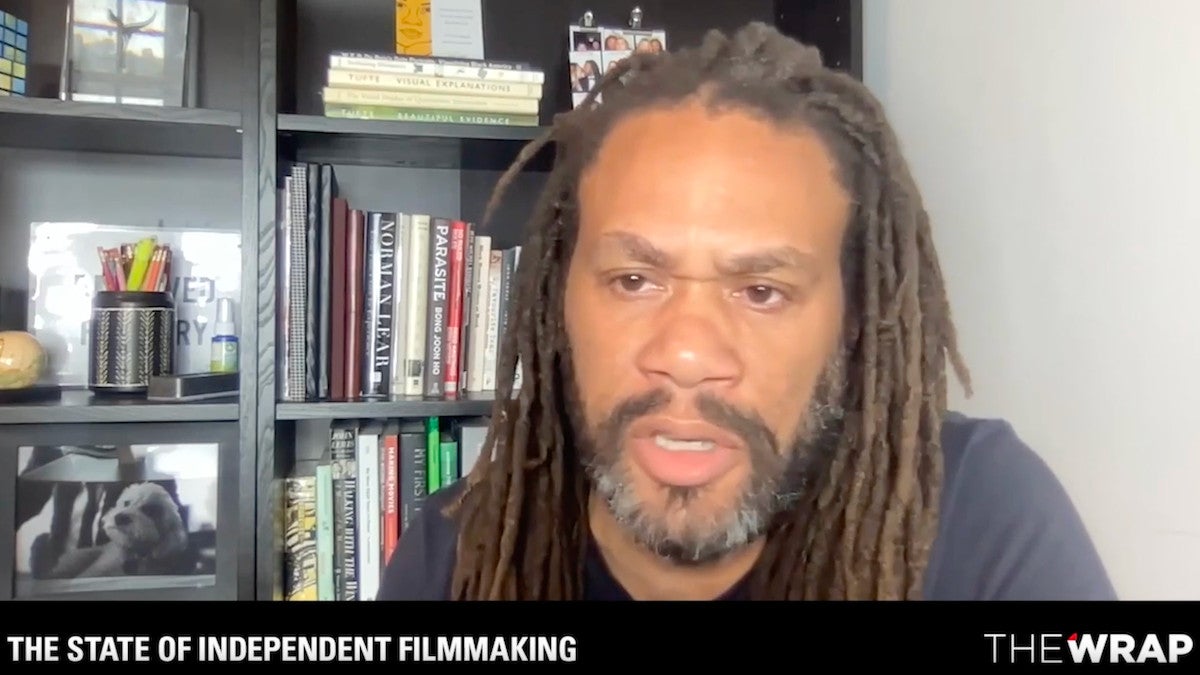
Amid an industry overwhelmed by an ongoing writers’ strike and a push to streaming, the notion of genuine independent cinema is as fragile as ever.
With the streamers cutting costs and focusing on content that large swathes of viewers might actually watch, the content for content’s sake spending booms that allowed indie cinema to temporarily flourish seems to have come to an end. Is all hope lost?
In a recent panel hosted exclusively by TheWrap, titled “The State of Independent Filmmaking,” Franklin Leonard argued that while investing in independent film if widely considered a financial risk or act of altruism, his work as founder of The Black List has proven that the opposite is true. The best screenplay is the best business plan.
“I think there is an assumption that when you work in the indie space, or you’re seeking out writers from outside the traditional system, that there’s some sort of altruistic impulse behind it. It’s exactly the opposite,” Leonard said, posing that his Black List, a highly regarded online reference naming the year’s best unproduced screenplays, “comes from a fundamental desire to increase and improve the economics of the industry.”
He then cited a recent study from Harvard Business School investigating the financial performance of scripts found and ultimately produced from The Black List.
“Controlling for all other factors, movies made from Black List scripts, some of which were distributed by the studios, made 90% more in revenue than movies made from scripts that were not on The Black List,” he said.
Asked for his definition of success in indie film, Leonard said that success was a film “that delivers a financial profit that exceeds what you could get by investing in a conservative mutual fund [or] one that is well received by audiences that people will still be talking about 20 years from now.”
Leonard was joined on the deep-dive Zoom discussion with moderator and Elevated Films president Cassian Elwes, Killer Films co-president Christine Vachon, 30West co-president and CEO Micah Green and UTA’s partner and head of independent film Rena Ronson.
The loosely moderated and wide-ranging roundtable spanned the gamut between what once was and what might be in the future.
Vachon, when asked how she puts money together for a new project today, said, “I don’t even know if it’s easier or harder, it’s different.” She added that while she would love for audiences to pack art house theaters, “there are opportunities for different kinds of movies to find a place to be seen that they didn’t have before.”
Ronson chimed in, stating that cycles in production processes are normal, but the last three years have been extraordinary in how frequent they’ve become.
“We got COVID, streaming was contracted, people became more risk averse — all these things that are hitting us. Because we’re indie, we roll up our sleeves,” Ronson said. “Our job is to figure out alternative ways to get movies made. So we have to exercise our brain in a different way.”
Green pivoted by discussing the changing definitions of an independent film, at least in mainstream media discourse.
“I’ve seen the definition of independent film change,” Green said, “or at least become very contextual, or sometimes talking about films that are made kind of [do it yourself] with friends and family, usually with emerging filmmakers. Sometimes we’re talking about what people call ‘smart house’ movies — just intelligent, left-of-center movies, which may have been made by a studio and at any budget, but they’re still called independent anyway.”
However, he stressed that when he thinks of independent films, he’s usually thinking of movies that aren’t being funded by the studios: “Whatever they’re not funding by nature sort of becomes independent. And those tend to be risky movies because they’re being made, usually without distribution.”
Green also spoke of evaluating the financial potential of a new project that crosses his desk.
“We’re trying to forecast sales potential or box office potential, sometimes a combination of the two,” he said. “You need distribution to have a shot at the box office. The pendulum seems to have swung back to how it was 10, 15 years ago, where we can’t take for granted distribution or sales.”
Green further explained that a large chunk of the community of filmmakers started relying on streamers and studios for financing, or at least distribution, but Ronson noted that sometimes the choice to pursue theatrical distribution or streaming distribution is up to the creators themselves.
“There plenty of examples where we passed on a streaming deal,” Ronson said. “Lulu Wang’s ‘The Farewell,’ she wanted her film in theaters. It was important to her.”
The final question, asked by Elwes, was to what extent they felt hopeful for the future. They all answered with varying optimism, while Leonard argued, “It’s a practice of conscious optimism, as I suspect it is for all of us. It’s a choice to be hopeful.”
Ronson emphasized that “we want to see original stories, we don’t want to just see the sequels.”
Green noted that his optimism was rooted in the fact that “there are many more financing sources, marketing distribution platforms, than there were when I started in this business.”
Then Vachon was given the last word. She expressed optimism that the new generation of storytellers will continue making their art in a different way than the generations before them.
“When my daughter discovered YouTube stars, it was like when I discovered punk rock. It was speaking just to me, and it was supposed to speak just to me,” she said. “Every generation has that, and it’s exciting to figure out our avenues to finding those talents and bringing them to the forefront.”

















